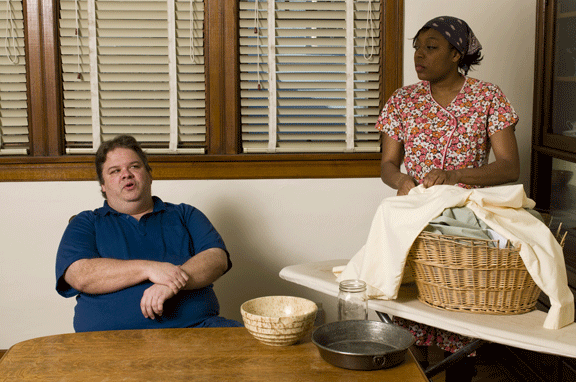Originally from Texas, Terri Wagener has
lived in New York and LA, writing scripts for the stage, then for the
screen, and now back again. Her plays have been produced at Yale
Rep, South Coast Rep, Actors Theater of Louisville, and O'Neill National
Playwrights Conference. There have also been several highly
acclaimed productions in LA and New York.
Her highest profile work for the big screen is Fried Green Tomatoes
(1991). “I was the last writer hired, and I wrote the draft of
that movie that got Jessica Tandy to say ‘yes’ – which got the film
made,” Terri explained. “I was very familiar with the world of
Whistle Stop, Alabama (it was much like small-town Texas), so I felt
very comfortable in that story.”
 She continued to work as a “script doctor” in the film
industry: “I wrote movies in L.A. for a number of years. I
made a living at it. So many go nowhere, of course – for no reason
having to do with the script – and it can be very frustrating and
discouraging. I love the writing part of it, but the business and
people part of Hollywood has always held little charm for me.”
She continued to work as a “script doctor” in the film
industry: “I wrote movies in L.A. for a number of years. I
made a living at it. So many go nowhere, of course – for no reason
having to do with the script – and it can be very frustrating and
discouraging. I love the writing part of it, but the business and
people part of Hollywood has always held little charm for me.”
Terri went on to explain why she has shifted her focus back to
her first love, playwriting. “There are many writers making great
livings in Hollywood with none of their works ever being produced or
seen. If I had a family or mortgage to support, I might go that
way, but I am a single, selfish artist, and I want to make a difference
in the world and in people's lives. Working hard on a script to
see it shot down in an afternoon is not a life I can lead – even if it
means I get a new car every year. So I got a day job, and returned
to the theater.”
She decided her goal would be one play per
year, submitting to playwriting contests and “not caring if they got
picked or not” – though she admitted that is easier said than
done. She wrote Work in the summer of 2006, her first play
in her return to the theater. And “BPP's nod – and production –
has been an invaluable encouraging word,” she said.
That full production, along with a cash
prize, sets the Reva Shiner contest apart from most other similar
contests around the country. And past winners have gone on to
further acclaim, such as Sarah Treem, Buzz McLaughlin, and Janet
Burroway.
Work is the story of an African
American woman who receives an unexpected visit from a representative of
her late husband’s employer. He is there to give her a widow’s
compensation check, but it turns out to be anything but a routine
delivery. The ‘60s setting becomes a reflection on current times,
accomplished with, as Terri put it, “comedy and a surprising poignancy
of the characters and their tenuous relationship.”
 When
I asked Terri how her story came about, she answered, “I was thinking
about how our president sounds so much like my dad (they are both oil
men), and how hard it was, as a child, with LBJ as President, for me to
question my dad or his values – since he and the leader of the free
world sounded exactly alike. I thought about how voices and
language affect us, and the parallels went from there.”
When
I asked Terri how her story came about, she answered, “I was thinking
about how our president sounds so much like my dad (they are both oil
men), and how hard it was, as a child, with LBJ as President, for me to
question my dad or his values – since he and the leader of the free
world sounded exactly alike. I thought about how voices and
language affect us, and the parallels went from there.”
War makes for an unfortunate but notable comparison. The
similarities between “Vietnam and Iraq were being drawn. And I
kept thinking about some small girl today, watching the world.
What will she know when she is my age that we cannot foresee now?” Terri
wondered. “Any suggestion in 1968 that the Soviet Union would no
longer be a Super Power would have been met with universal disbelief.
‘Communism’ was the great enemy, as ‘terrorism’ is today.”
Although she did a lot of research and a lot of remembering,
she had to whittle down a foot-tall stack of notes to a 75-page script
(“with very wide margins”). As is her style, comic dialogue mixes
up serious subjects. She explained, “When you make an audience
laugh, they naturally are eager for whatever you have to say
next.”
And a woman having something to say through her stories,
characters, and themes, on stage or on screen, is important because of
the unequal representation of women in writing, directing, and
producing. And thus the unequal range of roles available to women
as performers. “The world needs more writers – writing good roles
for women – more than it needs more actresses right now,” Terri
asserted. “And the writer’s life suits me.”
If you’re in this neck of the woods, Bloomington Playwrights Project’s world premiere of Terri Wagener’s Work begins May 8 and continues on weekends through May 24, 2008.
Photos are courtesy of Bloomington Playwrights Project
 She continued to work as a “script doctor” in the film
industry: “I wrote movies in L.A. for a number of years. I
made a living at it. So many go nowhere, of course – for no reason
having to do with the script – and it can be very frustrating and
discouraging. I love the writing part of it, but the business and
people part of Hollywood has always held little charm for me.”
She continued to work as a “script doctor” in the film
industry: “I wrote movies in L.A. for a number of years. I
made a living at it. So many go nowhere, of course – for no reason
having to do with the script – and it can be very frustrating and
discouraging. I love the writing part of it, but the business and
people part of Hollywood has always held little charm for me.” When
I asked Terri how her story came about, she answered, “I was thinking
about how our president sounds so much like my dad (they are both oil
men), and how hard it was, as a child, with LBJ as President, for me to
question my dad or his values – since he and the leader of the free
world sounded exactly alike. I thought about how voices and
language affect us, and the parallels went from there.”
When
I asked Terri how her story came about, she answered, “I was thinking
about how our president sounds so much like my dad (they are both oil
men), and how hard it was, as a child, with LBJ as President, for me to
question my dad or his values – since he and the leader of the free
world sounded exactly alike. I thought about how voices and
language affect us, and the parallels went from there.” 

